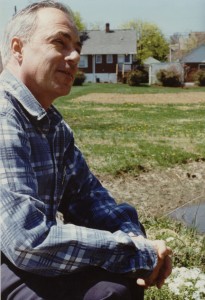Maryknoll Priest
Father David Schwinghamer’s daily routine is now centered on one person: his 61-year-old younger brother. In 2006, David became the full-time caregiver to a brother who had been born with Down’s Syndrome and now has Alzheimer’s Disease.
In his fifth year of this ministry, David says matters have deteriorated to the point that his brother spends most of his time in a wheelchair and is not able to communicate much. “He clearly suffers a lot, but he never complains,” says David. Nor does David, though his caregiving keeps him confined much of the week to the suburban Minneapolis townhouse where he and his brother live.
When he is no longer needed by his brother, David hopes to be able to return to Africa to work with his Maryknoll order of priests, nuns, and lay missioners. He has already spent about a third of his life (22 years) in Africa, mostly based in Tanzania and Kenya.
In the 1990s, around the time that David came to CTP (now CJP) to earn his graduate certificate in conflict transformation, he worked with Jesuit Refugee Service to assist Burundian and Rwandan refugees in camps in western Tanzania.
David thinks one day he may be able to be of service in the new university the Jesuits are building in southern Sudan. “I could teach conflict resolution and reconciliation, because this seems to be where the church is going in Africa,” he says.
David feels the greatest challenge for peacebuilders is to determine the “next step” once violent situations have subsided into a semblance of stability.
“Some of the reconciliation stuff can be a smoke screen, if underlying problems are suppressed. It is not enough [for instance] to say, ‘We are not going to talk of ethnicity anymore; we are all the same – we are all Rwandans!’ If the situation hasn’t changed, if there is, in fact, one minority group in power, then that underlying problem must be raised to the surface to achieve reconciliation.”
